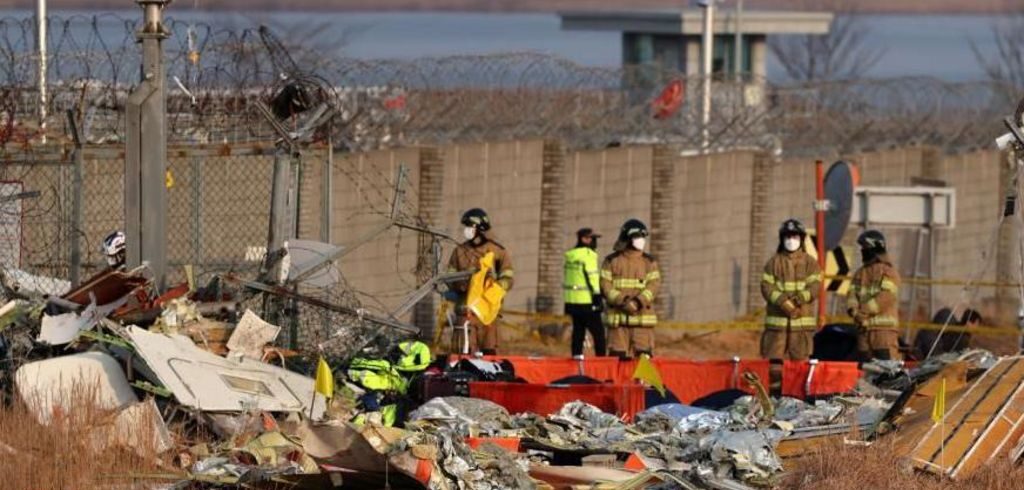The Role of Bird Strikes in Deadly Jeju Air Crash in South Korea

On a tragic Sunday morning, South Korea faced its deadliest aviation disaster in history. A Jeju Air flight, carrying 181 people, crashed while attempting to land at Muan International Airport. The incident resulted in the loss of more than 170 lives, leaving families and the nation in mourning. As investigations unfold, authorities are examining various factors that may have contributed to this catastrophic event.
Details of the Crash
The ill-fated flight, designated 7C2216, was a Boeing 737-800 operated by Jeju Air, South Korea’s leading budget airline. The aircraft was returning from Bangkok, Thailand, and was scheduled to land at approximately 09:00 local time. However, as the plane approached the runway, air traffic control issued a warning about a potential bird strike. This prompted the pilot to hold off on landing. Just two minutes later, the pilot declared a Mayday. Air traffic control then permitted the plane to land from an alternate direction. Eyewitness accounts describe a harrowing scene as the aircraft touched down without deploying its landing gear. It skidded down the runway, collided with a wall, and erupted into flames. Witnesses reported hearing a loud bang followed by a series of explosions. Fire crews quickly responded to extinguish the blaze, but the damage was catastrophic.
Lee Jeong-hyun, chief of the Muan fire department, noted that while the tail section of the plane was identifiable, the rest of the aircraft was unrecognizable. Investigators are currently analyzing the flight and voice recorders, although reports indicate that the former may have sustained damage. The exact cause of the crash remains under investigation, with officials considering both bird strikes and adverse weather conditions as potential factors.
The Role of Bird Strikes
Bird strikes are a common hazard in aviation, occurring when a bird collides with an aircraft in flight. In the UK alone, over 1,400 bird strikes were reported in 2022, with only a fraction causing significant damage. The most notable incident occurred in 2009 when an Airbus made an emergency landing on the Hudson River after hitting a flock of geese, with all passengers surviving. In the case of the Jeju Air crash, a South Korean transport official indicated that the flight had received a bird strike warning shortly before the incident. However, experts express skepticism about whether a bird strike alone could have caused such a catastrophic failure. Geoffrey Thomas, an aviation expert, stated that bird strikes typically do not lead to the loss of an aircraft. Similarly, Australian safety expert Geoffrey Dell remarked that he had never seen a bird strike prevent landing gear from being deployed.
As investigations continue, authorities are working to determine the precise sequence of events leading to the crash. The recovery of the flight recorders will be crucial in understanding what transpired during the final moments of the flight.
Passenger and Crew Details
The flight was carrying 175 passengers and six crew members. Among them were two Thai nationals, while the majority were South Korean, many returning from a Christmas holiday in Thailand. The official death toll currently stands at 179, making this the deadliest plane crash in South Korean history. Tragically, all passengers and four crew members lost their lives. Authorities have identified at least 88 bodies so far, with recovery efforts ongoing. Among the deceased were five children under the age of ten, with the youngest being just three years old. The oldest passenger was 78. In a glimmer of hope amidst the tragedy, two crew members survived the crash. They were located in the tail section of the aircraft and have since been hospitalized. More than 1,500 emergency personnel, including firefighters and police officers, have been deployed to assist in recovery efforts. They are scouring the area around the runway for debris and any remaining victims.
National Mourning and Response
In the wake of this devastating incident, South Korea’s acting president, Choi Sang-mok, declared a special disaster zone in Muan. This designation allows for central government funding to support local authorities and assist victims’ families. All flights to and from Muan International Airport have been canceled as the nation grapples with the aftermath of the tragedy. Families of the victims have gathered at the airport, anxiously awaiting news about their loved ones. Authorities have set up tents for bereaved families to grieve privately, while the sounds of sorrow echo through the terminal. Many families express frustration over the lengthy identification process for the victims.
Jeju Air has publicly apologized to the families affected by the crash. The airline’s chief executive stated that this incident marks the first fatal accident since its establishment in 2005. Boeing, the aircraft manufacturer, has also extended its condolences to those impacted by the tragedy.
As South Korea enters a period of national mourning, flags at government offices will be lowered in honor of the victims. The government has pledged to support the injured and ensure that the causes of this disaster are thoroughly investigated.
Observer Voice is the one stop site for National, International news, Sports, Editor’s Choice, Art/culture contents, Quotes and much more. We also cover historical contents. Historical contents includes World History, Indian History, and what happened today. The website also covers Entertainment across the India and World.

